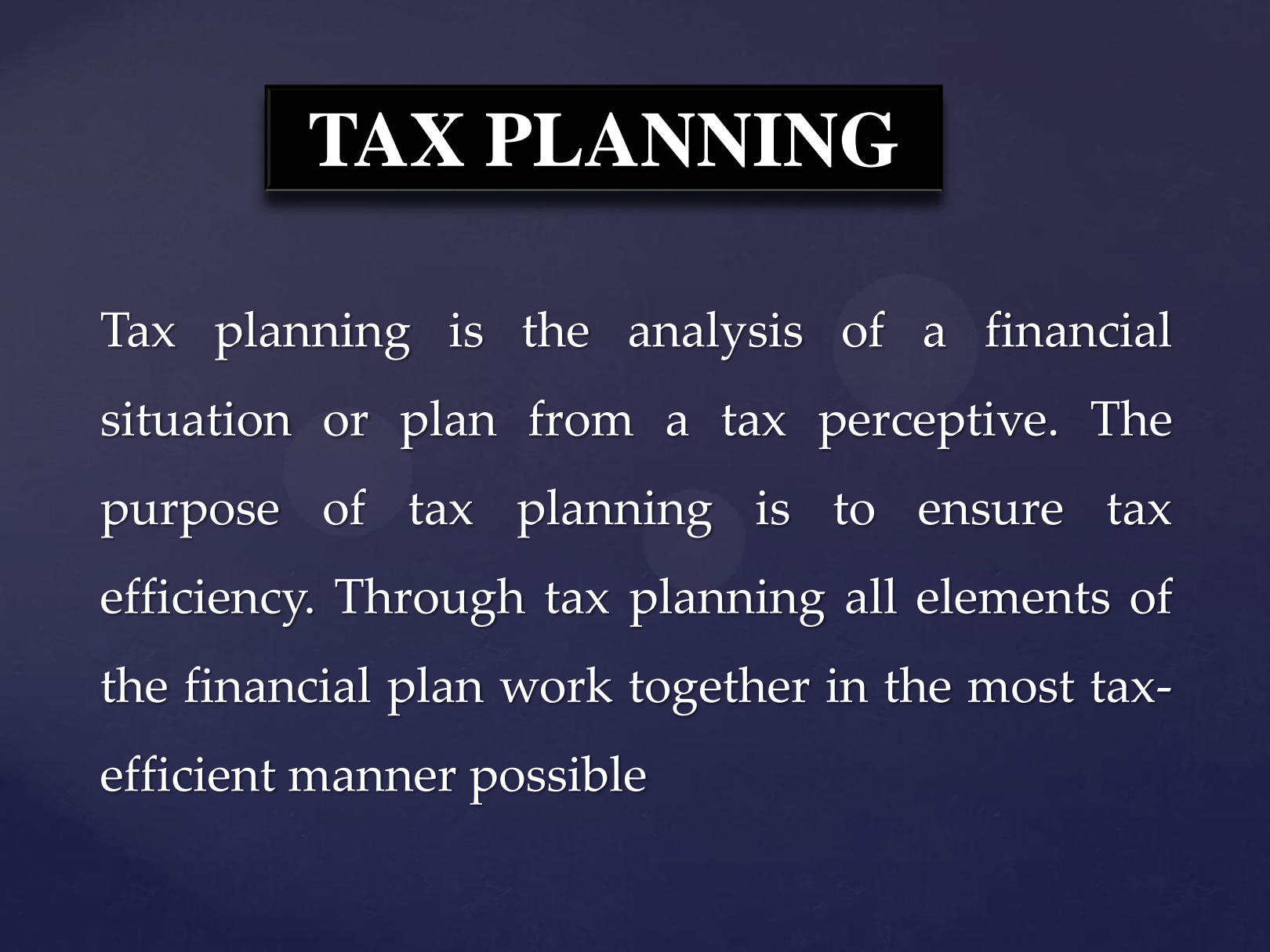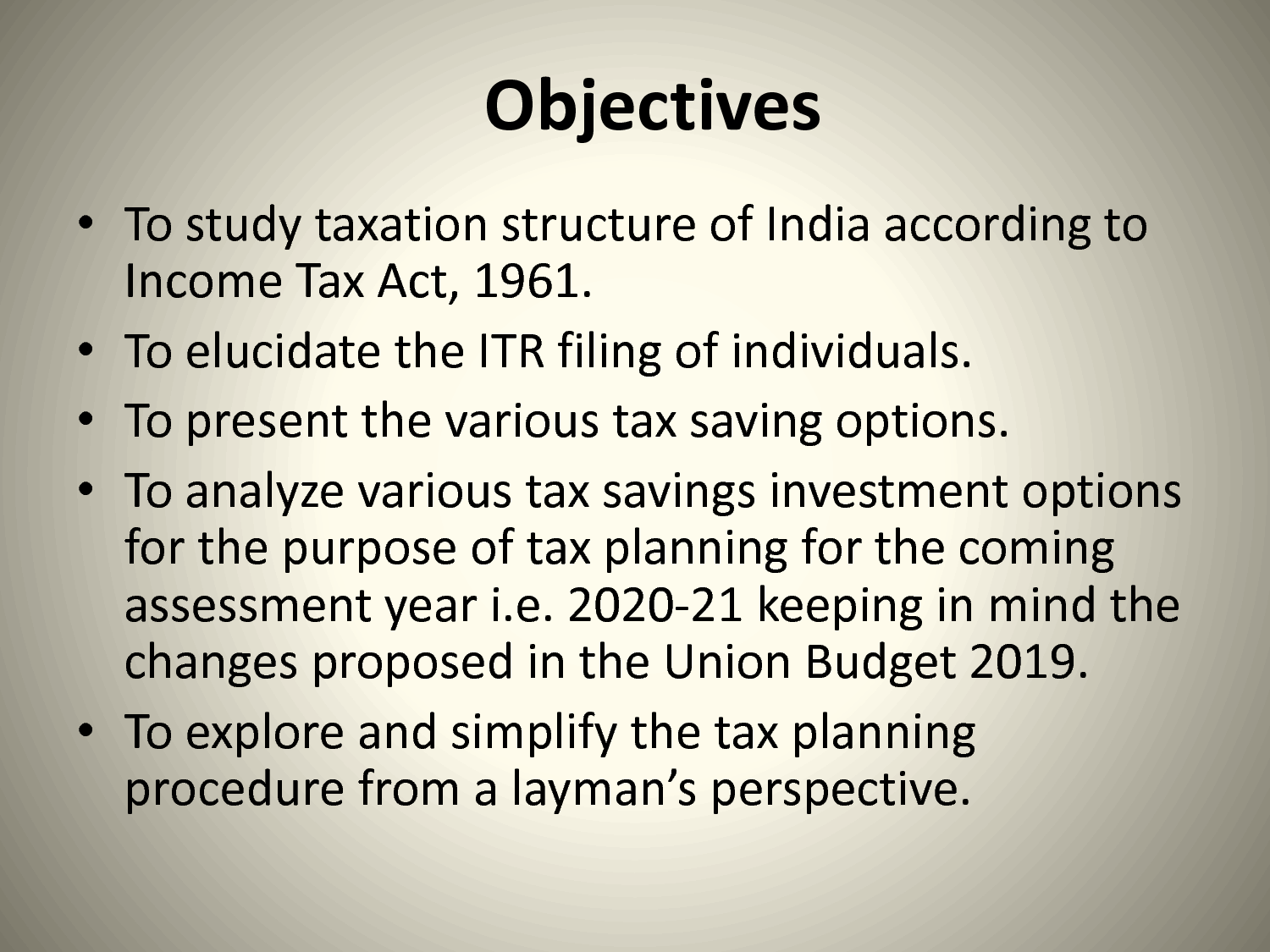

Finance
What Does Tax Planning Mean?
Published: January 21, 2024
Understanding tax planning and its significance in finance. Explore how tax planning strategies can help optimize your financial situation and minimize your tax liabilities.
(Many of the links in this article redirect to a specific reviewed product. Your purchase of these products through affiliate links helps to generate commission for LiveWell, at no extra cost. Learn more)
Table of Contents
Introduction
Tax planning is an essential aspect of personal and business finance that can have a significant impact on your financial well-being. It involves strategic decision-making and careful financial analysis to minimize your tax liability and optimize your financial situation.
Understanding tax planning and its implications can help you make informed decisions that can save you money, maximize your tax deductions, and ultimately increase your financial stability. This article aims to provide a comprehensive overview of tax planning, its importance, key elements, strategies, benefits, common mistakes to avoid, and the role of tax professionals.
Whether you are an individual, a small business owner, or a corporation, tax planning is crucial. By proactively managing your taxes, you can legally and ethically reduce your tax burden and allocate those savings towards investment, retirement planning, debt reduction, or other financial goals.
With the ever-changing tax laws and regulations, staying informed and implementing effective tax planning strategies has become even more critical. This article aims to demystify tax planning and empower you to take control of your financial future.
Let’s dive into the world of tax planning and explore how it can benefit you and your financial goals.
Definition of Tax Planning
Tax planning refers to the process of organizing and structuring one’s finances in a way that minimizes tax liabilities while remaining compliant with applicable tax laws and regulations. It is a proactive approach to managing your financial affairs to legally and ethically reduce the amount of taxes you owe.
At its core, tax planning involves analyzing your financial situation, understanding the tax laws, and identifying strategies and opportunities to optimize your tax position. It is about taking advantage of available deductions, credits, exemptions, and incentives to minimize your taxable income and the overall tax burden.
Tax planning is not about evading taxes or engaging in illegal practices. It focuses on utilizing legitimate tax-saving strategies provided by the government to mitigate the impact of taxes on your personal or business finances. It is a proactive approach that helps you make informed financial decisions throughout the year, rather than scrambling at the last minute during tax season.
Effective tax planning takes into account various factors such as your income sources, investments, deductions, credits, and potential changes in tax laws. It requires a thorough understanding of the tax code and regulations, as well as the ability to analyze financial data and project future income and expenses.
Furthermore, tax planning is not limited to individuals. It is equally important for businesses of all sizes to develop comprehensive tax strategies that align with their financial goals. Corporations, partnerships, and sole proprietorships can all benefit from tax planning by optimizing their structure, taking advantage of available tax incentives, and strategically managing their taxable income.
In summary, tax planning is the proactive and strategic management of your financial affairs to minimize tax liabilities within the boundaries of the law. It involves careful analysis, informed decision-making, and implementing effective tax-saving strategies to optimize your financial situation and achieve your long-term financial goals.
Importance of Tax Planning
Tax planning plays a crucial role in personal and business finance, offering several significant benefits that can positively impact your financial well-being. Let’s explore the importance of tax planning in more detail:
- Minimizing Tax Liabilities: One of the primary reasons for tax planning is to reduce the amount of taxes you owe. By strategically utilizing deductions, credits, and exemptions, you can lower your taxable income and potentially enter a lower tax bracket. This can lead to substantial savings over time.
- Optimizing Financial Resources: Effective tax planning allows you to allocate your financial resources more efficiently. By minimizing your tax burden, you have more funds available to invest, save, or reinvest in your business. This can ultimately contribute to your financial growth and help you achieve your long-term financial goals.
- Achieving Financial Goals: Tax planning helps align your financial decisions with your overall goals. Whether you’re saving for retirement, paying off debt, or funding education, tax planning can provide opportunities to optimize your tax position and allocate more funds towards your goals. It allows you to make the most of your money and set yourself up for financial success.
- Ensuring Compliance: Tax planning goes hand in hand with tax compliance. By staying on top of your tax obligations and implementing effective strategies, you can ensure that you fulfill your tax responsibilities while minimizing the risk of audits, penalties, or other legal issues that may arise from noncompliance.
- Adapting to Changing Tax Laws: Tax laws are subject to change, and staying up to date with these changes can be challenging. Engaging in tax planning helps you stay informed and adapt your financial strategies to align with any new regulations or incentives that may arise. This can help you capitalize on new opportunities and avoid any adverse effects of changing tax laws.
In summary, tax planning is crucial for maximizing your financial resources, minimizing tax liabilities, and ensuring compliance with tax laws. It provides opportunities to optimize your financial decisions, achieve your long-term goals, and adapt to changing tax regulations. By engaging in effective tax planning strategies, you can take control of your financial future and build a solid foundation for lasting financial success.
Key Elements of Tax Planning
To effectively engage in tax planning, it is important to understand the key elements involved. These elements form the foundation of a successful tax planning strategy. Let’s explore them in more detail:
- Income Analysis: Evaluating your income sources is a fundamental step in tax planning. It includes assessing your salary, investments, rental income, business profits, and any other sources of income. Properly categorizing and analyzing your income helps determine your tax bracket and identify opportunities for deductions and credits.
- Deductions and Exemptions: Understanding the deductions and exemptions available to you is crucial for reducing your taxable income. These may include deductions for expenses such as mortgage interest, medical expenses, education costs, and charitable contributions. By maximizing deductions and exemptions, you can lower your overall tax liability.
- Tax Credits: Tax credits are a powerful tool in tax planning as they directly reduce the amount of taxes you owe. Examples of tax credits include the earned income tax credit, child tax credit, and education credits. Identifying and utilizing available tax credits can significantly lower your tax bill.
- Timing of Income and Expenses: The timing of when you receive income and when you incur expenses can impact your tax liability. Strategic timing of income and expenses can help you optimize your tax position. For example, deferring income to a later year or accelerating deductions into the current year can potentially lower your tax liability.
- Investment Strategies: Tax planning also involves considering the tax implications of your investments. This includes assessing how capital gains, dividends, and interest income are taxed and exploring strategies to minimize taxes on investment returns. Utilizing tax-efficient investment vehicles such as tax-advantaged retirement accounts can provide long-term tax benefits.
- Estate Planning: Estate taxes can significantly impact your heirs and beneficiaries. Incorporating estate planning as part of your tax strategy can help minimize estate taxes and ensure a smooth transfer of wealth. This may involve setting up trusts, gifting strategies, and taking advantage of applicable estate tax exemptions.
- Record Keeping: Maintaining thorough and accurate records is essential for successful tax planning. Proper documentation allows you to substantiate your deductions, credits, and income sources, ensuring compliance with tax laws and minimizing the risk of audits or disputes with tax authorities. Organize and retain all relevant financial documentation to support your tax planning efforts.
By considering and incorporating these key elements into your tax planning strategy, you can optimize your tax position, minimize tax liabilities, and maximize your financial resources. It is important to consult with a tax professional or financial advisor to ensure you employ the most effective strategies based on your unique financial situation and goals.
Strategies and Approaches for Tax Planning
When it comes to tax planning, there are various strategies and approaches that individuals and businesses can employ to minimize their tax liabilities and optimize their financial situation. Here are some commonly used strategies:
- Maximize Deductions: Take advantage of available deductions to reduce your taxable income. This may include deductions for mortgage interest, state and local taxes, medical expenses, and education-related expenses. Keep meticulous records of expenses and consult with a tax professional to identify all eligible deductions.
- Utilize Tax-Advantaged Accounts: Contributing to tax-advantaged retirement accounts, such as 401(k)s or IRAs, can provide immediate tax benefits. Contributions to these accounts are often tax-deductible, and earnings grow tax-deferred until withdrawal. Consider the various retirement account options available to find the most suitable one for your financial goals.
- Strategic Capital Gains and Losses: Timing the realization of capital gains and losses can help minimize your tax liability. Consider selling investments with capital losses to offset gains and reduce your overall taxable income. It’s important to consult with a financial advisor or tax professional to understand the rules and limitations surrounding capital gains and losses.
- Employ Tax Credits: Tax credits directly reduce your tax liability, making them highly valuable in tax planning. Determine if you qualify for tax credits such as the child tax credit, earned income tax credit, or education-related credits. Research and understand the eligibility criteria for each credit and take advantage of any applicable opportunities.
- Consider Charitable Contributions: Making charitable donations not only benefits causes you care about, but it can also provide tax advantages. Charitable contributions may be tax-deductible, so consider donating to qualified charities to reduce your taxable income. Remember to keep proper documentation, such as receipts, to support your deductions.
- Explore Business Expense Deductions: If you are a small business owner or self-employed, it’s important to maximize your business expense deductions. This includes deducting expenses related to office space, equipment, travel, and professional services. Stay updated on relevant tax laws and work with a tax professional familiar with small business deductions to optimize your tax outcomes.
- Plan for Estate Taxes: Estate planning is an important aspect of tax planning for individuals with significant assets. By implementing strategies such as gifting, trusts, and leveraging estate tax exemptions, you can minimize the tax burden on your estate and ensure the smooth transfer of wealth to your heirs.
It’s crucial to note that tax planning strategies may vary depending on personal circumstances, tax regulations, and financial goals. Consulting with a qualified tax professional or financial advisor is highly recommended to develop a tailored tax planning strategy that aligns with your specific situation and maximizes your tax savings.
Benefits of Tax Planning
Tax planning offers numerous benefits that can significantly impact your financial well-being and long-term financial goals. Let’s explore some of the key advantages of engaging in effective tax planning:
- Maximize Tax Deductions and Credits: Through strategic tax planning, you can identify and take advantage of eligible deductions and credits. This can result in substantial tax savings by reducing your taxable income or directly reducing the amount of taxes you owe.
- Minimize Tax Liabilities: By employing tax planning strategies, you can minimize your tax liabilities both in the short term and long term. Properly managing your finances allows you to legally and ethically reduce your tax burden and keep more of your hard-earned money.
- Optimize Financial Resources: Effective tax planning allows you to allocate your financial resources more efficiently. By minimizing your taxes, you have more funds available for saving, investing, or reinvesting in your business. This can contribute to your overall financial growth and help you achieve your financial goals faster.
- Enhance Cash Flow: Efficient tax planning can improve your cash flow by reducing the amount of taxes you pay throughout the year. This additional cash can be used to meet immediate financial obligations, invest in opportunities, or save for long-term goals.
- Align Financial Decisions with Goals: Tax planning helps align your financial decisions with your overall objectives. By considering the tax implications of various actions, you can make informed choices that support your financial goals. This includes decisions related to investments, retirement planning, charitable giving, and more.
- Adapt to Changing Tax Laws: Tax laws and regulations are subject to change. Engaging in tax planning ensures that you stay updated and can adapt your strategies accordingly. This allows you to take advantage of new tax incentives, adjust your financial plans, and avoid any adverse impacts of changing tax rules.
- Reduce Risk of Audits and Penalties: By proactively managing your taxes, you can reduce the risk of audits and penalties. Proper record-keeping, accurate reporting, and compliance with tax laws can help you avoid any legal issues and maintain a good relationship with tax authorities.
Overall, effective tax planning offers financial stability, increased savings, and the ability to align your financial decisions with your long-term goals. It empowers you to take control of your finances, optimize your tax position, and create a solid foundation for financial success.
Common Mistakes to Avoid in Tax Planning
While tax planning is crucial for optimizing your financial situation, it’s important to be aware of common mistakes that can hinder your efforts. By avoiding these mistakes, you can ensure that your tax planning strategy remains effective and compliant. Here are some common mistakes to avoid:
- Failing to Stay Updated: Tax laws and regulations change frequently, and failing to stay updated can lead to missed opportunities or noncompliance. Stay informed about new tax laws, deductions, credits, and filing requirements to ensure that your tax planning strategies are based on the most current information.
- Neglecting Record-Keeping: Accurate record-keeping is essential for successful tax planning. Failing to maintain organized and thorough records can result in missed deductions, inconsistent reporting, and audit triggers. Keep track of receipts, invoices, financial statements, and other relevant documents to support your deductions and income reporting.
- Overlooking Deductions and Credits: Not fully understanding or utilizing available deductions and credits can lead to missed tax savings. Take the time to research and explore all applicable deductions and credits that can help reduce your taxable income or directly lower your tax liability.
- Ignoring Retirement Contributions: Contributions to retirement accounts, such as 401(k)s or IRAs, can provide significant tax advantages. Ignoring the opportunity to contribute to these accounts can result in missed tax deductions and potential growth in tax-advantaged investments.
- Procrastinating Tax Planning: Procrastination can limit your ability to implement effective tax planning strategies. Waiting until the last minute to gather necessary documents, analyze your financial situation, and consult with tax professionals can result in rushed decisions and missed opportunities.
- Failing to Seek Professional Advice: Tax laws and regulations can be complex, and the tax landscape is constantly evolving. Failing to seek professional advice from a qualified tax professional or financial advisor can result in suboptimal tax planning strategies or noncompliance with tax laws.
- Not Considering the Big Picture: Tax planning should not be viewed in isolation. It’s important to consider how your tax planning strategies align with your overall financial goals. Focusing solely on short-term tax savings without considering long-term financial objectives may result in missed opportunities for wealth accumulation and growth.
Avoiding these common mistakes can help you maximize your tax savings, maintain compliance with tax laws, and optimize your overall financial strategy. By staying informed, seeking professional advice when needed, and being proactive in your tax planning efforts, you can achieve greater financial stability and success.
Role of Tax Professionals in Tax Planning
Engaging the expertise of tax professionals can be highly beneficial when it comes to tax planning. These professionals have the knowledge and experience to navigate complex tax laws, optimize tax strategies, and ensure compliance. Here are some key roles that tax professionals play in tax planning:
- Expert Knowledge: Tax professionals are well-versed in tax laws, regulations, and best practices. They stay updated with the latest changes and possess a deep understanding of the nuances involved in tax planning. Their expertise allows them to identify tax-saving opportunities specific to your situation.
- Individualized Strategies: Tax professionals can create personalized tax planning strategies based on your unique circumstances, financial goals, and risk tolerance. They assess your income, expenses, investments, and deductions to develop a comprehensive plan tailored to minimize your tax liabilities and optimize your financial situation.
- Compliance and Risk Management: Tax professionals ensure that your tax planning strategies adhere to tax laws and regulations. They help you navigate complex tax requirements and minimize the risk of noncompliance, penalties, or audits. Their thorough understanding of compliance standards ensures that your tax planning efforts remain on the right side of the law.
- Tax Return Preparation: Tax professionals can prepare and file your tax returns accurately and efficiently. By leveraging their expertise, you can rest assured that your returns are completed correctly, maximizing deductions and credits while minimizing errors that could trigger audits or delays.
- Proactive Advice: Tax professionals take a proactive approach by offering year-round guidance and advice. They can help you make informed financial decisions throughout the year, considering the tax implications of each choice. Their advice can help optimize your tax position, maximize savings, and keep you on track towards your long-term financial goals.
- Representation in Audits: In case of an audit or tax dispute, tax professionals can represent you before tax authorities. They possess the knowledge and experience to handle the audit process, communicate with tax officials, and defend your position. Having a tax professional on your side provides peace of mind and ensures that your rights are protected.
While tax professionals offer valuable expertise and support, it’s essential to choose a qualified professional or firm. Look for professionals with relevant certifications (such as Certified Public Accountants or Enrolled Agents) and a track record of success in tax planning. Be proactive in seeking their services and maintain open communication to ensure your tax planning strategies are aligned with your financial goals.
In summary, tax professionals play a crucial role in efficient and effective tax planning. Their expert knowledge, personalized strategies, compliance guidance, and ongoing support can help you optimize your tax position, minimize tax liabilities, and achieve your financial objectives.
Conclusion
Tax planning is a vital component of personal and business finance that offers numerous benefits. By strategically managing your finances and implementing effective tax planning strategies, you can minimize tax liabilities, optimize your financial resources, and align your financial decisions with your long-term goals.
Throughout this article, we have explored the definition of tax planning, its importance, key elements, strategies, benefits, common mistakes to avoid, and the role of tax professionals. Understanding these aspects empowers you to take control of your financial future and make informed decisions that can maximize your tax savings.
Remember, tax planning is not a one-time event. It is an ongoing process that requires staying updated with tax laws, analyzing your financial situation, and adapting your strategies accordingly. Collaborating with a tax professional or financial advisor can provide valuable guidance and expertise to ensure your tax planning efforts remain effective and compliant.
By minimizing your tax liabilities, you can free up financial resources to save, invest, and work towards your financial goals. Whether you are an individual looking to optimize your personal finances or a business owner seeking to maximize profitability, tax planning is a critical tool in achieving long-term financial success.
In conclusion, proactive tax planning is an essential aspect of financial management that can have a significant impact on your overall financial well-being. Take charge of your financial future, explore the various tax planning strategies available, and seek professional guidance to develop a tailored approach that aligns with your unique circumstances and objectives. By doing so, you can position yourself for greater financial stability, minimize tax burdens, and set yourself up for a prosperous future.














